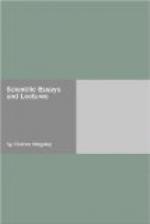Conceive the feelings of an old Lapland witch, who has had for the last fifty years all the winds in a sealskin bag, and has been selling fair breezes to northern skippers at so much a puff, asserting her powers so often, poor old soul, that she has got to half believe them herself—conceive, I say, her feelings at seeing her customers watch the Admiralty storm-signals, and con the weather reports in The Times. Conceive the feelings of Sir Samuel Baker’s African friend, Katchiba, the rain-making chief, who possessed a whole houseful of thunder and lightning—though he did not, he confessed, keep it in a bottle as they do in England—if Sir Samuel had had the means, and the will, of giving to Katchiba’s Negros a course of lectures on electricity, with appropriate experiments, and a real bottle full of real lightning among the foremost.
It is clear that only two methods of self-defence would have been open to the rain-maker: namely, either to kill Sir Samuel, or to buy his real secret of bottling the lightning, that he might use it for his own ends. The former method—that of killing the man of science—was found more easy in ancient times; the latter in these modern ones. And there have been always those who, too good-natured to kill the scientific man, have patronised knowledge, not for its own sake, but for the use which may be made of it; who would like to keep a tame man of science, as they would a tame poet, or a tame parrot; who say—Let us have science by all means, but not too much of it. It is a dangerous thing; to be doled out to the world, like medicine, in small and cautious doses. You, the scientific man, will of course freely discover what you choose. Only do not talk too loudly about it: leave that to us. We understand the world, and are meant to guide and govern it. So discover freely: and meanwhile hand over your discoveries to us, that we may instruct and edify the populace with so much of them as we think safe, while we keep our position thereby, and in many cases make much money by your science. Do that, and we will patronise you, applaud you, ask you to our houses; and you shall be clothed in purple and fine linen, and fare sumptuously with us every day. I know not whether these latter are not the worst enemies which science has. They are often such excellent, respectable, orderly, well-meaning persons. They desire so sincerely that everyone should be wise: only not too wise. They are so utterly unaware of the mischief they are doing. They would recoil with horror if they were told they were so many Iscariots, betraying Truth with a kiss.
But science, as yet, has withstood both terrors and blandishments. In old times she endured being imprisoned and slain. She came to life again. Perhaps it was the will of Him in whom all things live, that she should live. Perhaps it was His spirit which gave her life.




